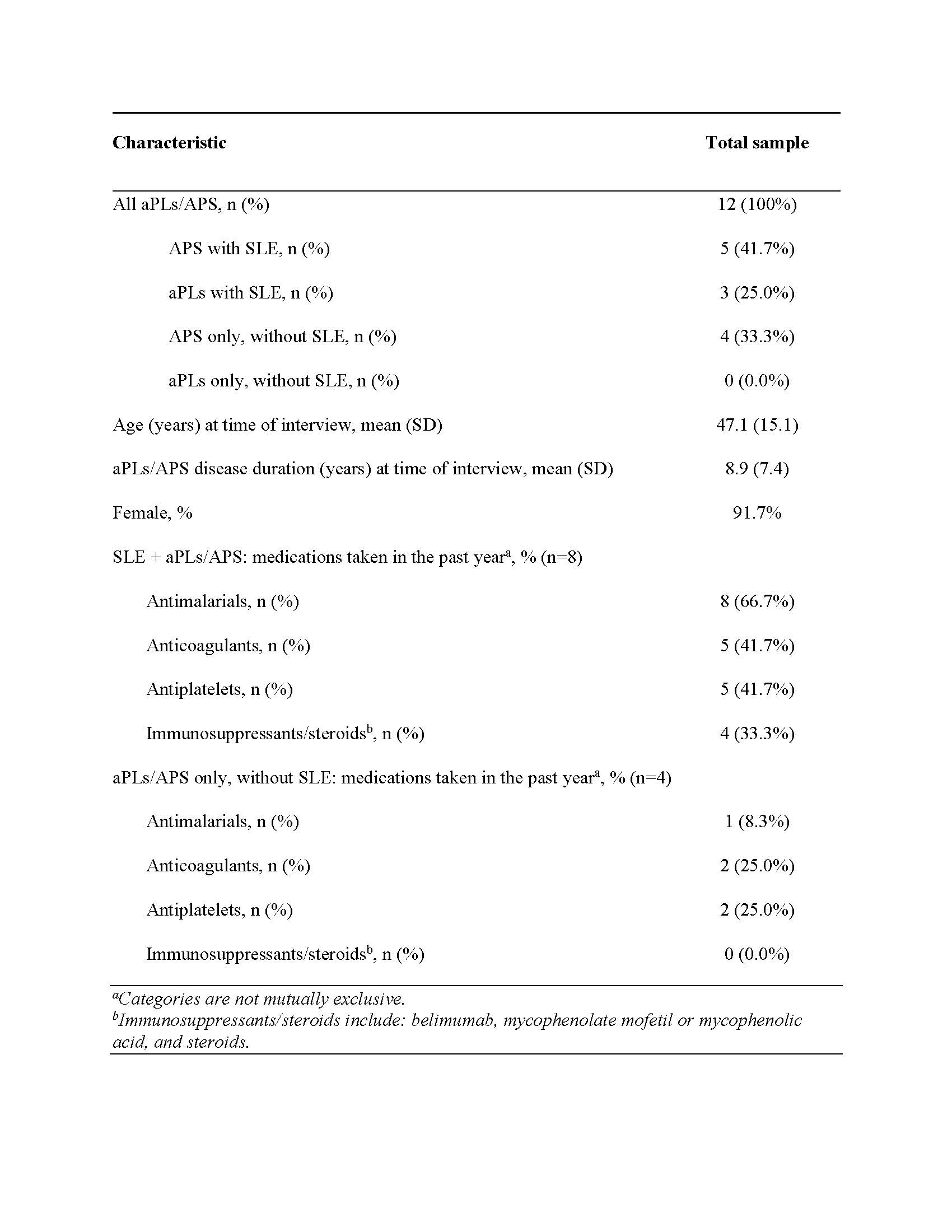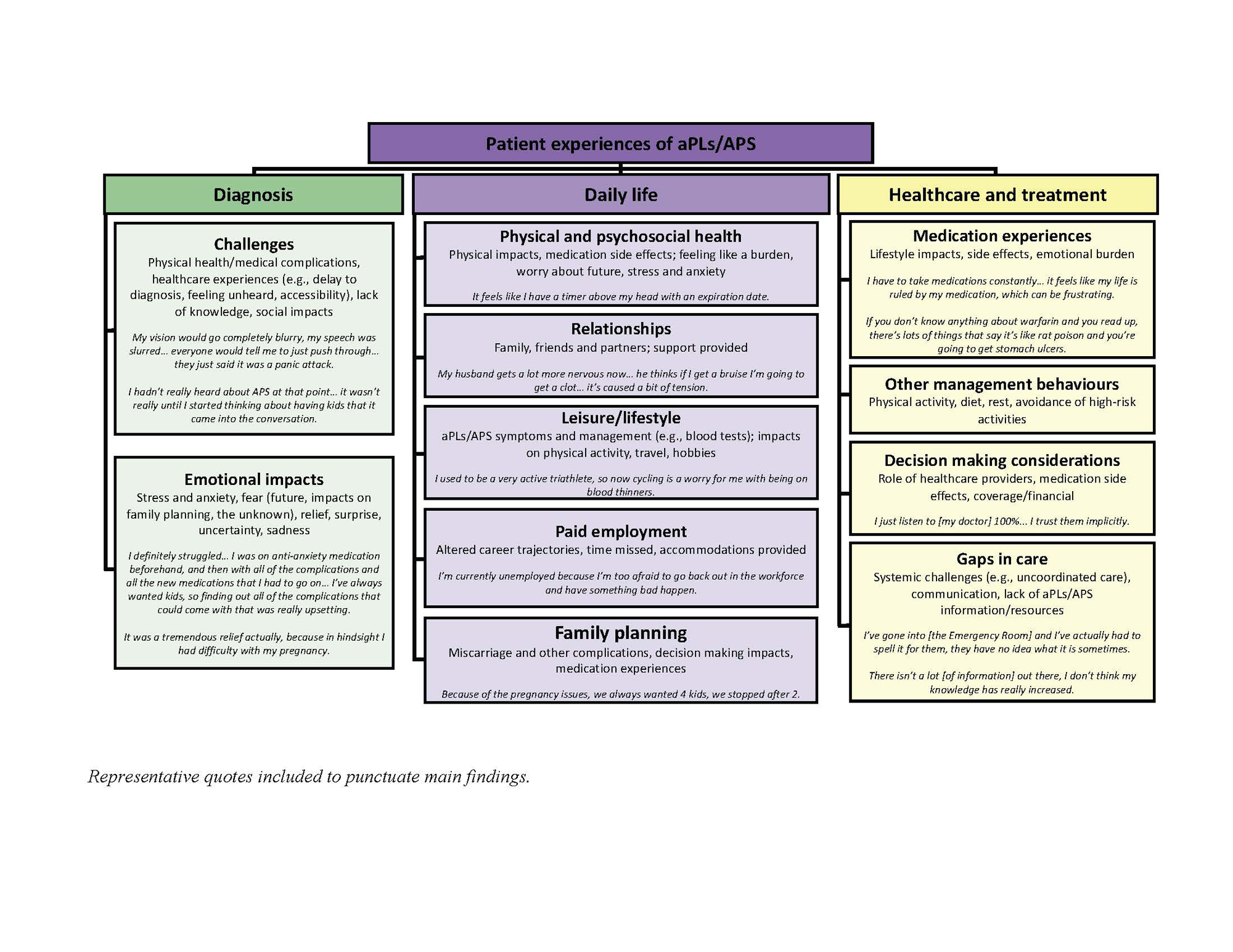Session Information
Date: Monday, November 13, 2023
Title: (1200–1220) Patient Outcomes, Preferences, & Attitudes Poster II
Session Type: Poster Session B
Session Time: 9:00AM-11:00AM
Background/Purpose: Substantial morbidity and mortality affect those with aPLs and APS, yet the patient experience remains poorly understood. This research investigated patient experiences of aPL/APS 1) diagnosis; 2) effects on daily life; and 3) healthcare and treatment.
Methods: Patients aged ≥18 years with ≥1 positive aPL on ≥2 occasions or those meeting the Revised Sapporo criteria for APS were purposefully recruited from a Canadian multidisciplinary APS clinic to participate in semi-structured in-depth interviews. Interviews were conducted virtually and transcribed verbatim for subsequent thematic analysis using NVivo software.
Results: Twelve patients with aPLs/APS were interviewed; 91.7% were female, mean (SD) age was 47.1 (16.1) years, 66.7% had aPLs/APS with SLE (per 1997 ACR or 2012 SLICC criteria), and 33.3% had aPLs/APS without SLE (Table 1). Patients experienced a range of challenges (e.g., obstetric and thrombotic complications) and emotional impacts (e.g., relief, anxiety) around the time of aPL/APS diagnosis (It’s been a traumatic experience (Participant #050)) (Figure 1). In addition to the physical and psychosocial impacts of living with aPLs/APS, patients reported modified leisure activities, altered employment trajectories, and both positive and negative impacts on relationships (My relationship with my family has become stronger, my relationship with the family that I’m potentially marrying into has become weaker (#040)). The past and future impacts on family planning were critical to how patients experienced living with aPLs/APS; specifically, they shared experiences of miscarriage and other pregnancy complications, fear of future impacts on pregnancy, and medication-related challenges, such as with low-molecular-weight heparin injections (I would have these bruises, it made it awkward when I would go for ultrasounds (#029)). Challenging aspects of aPL/APS healthcare and treatment were also discussed (Figure 1), particularly related to the lifestyle impacts, side effects, and emotional burden associated with medication use (I hate it, I hate it. It’s awful (#059)). Although a lack of aPL/APS resources was described, participants expressed trust in healthcare providers when making management decisions or when seeking information. Suggestions for resources included the need for additional medication-related information (long-term risks, dietary requirements; Being able to speak with somebody who knows how warfarin works in relation to Vitamin K… that was my biggest battle (#059)), examples to help contextualize management behaviours (Can I sit on the couch and watch a movie? Do I have to be constantly moving around? I think more situational examples would have been helpful (#041)), and additional information for those with aPLs/APS without SLE (There might be a whole different resource instead of just always focusing on the lupus patients (#050)).
Conclusion: Patients highlighted how the diverse manifestations of aPLs/APS, accentuated by management-related challenges, impose considerable physical and psychosocial burdens. Results will inform the development of patient resources and decision aids aligned with patient priorities.
To cite this abstract in AMA style:
Cardwell F, Kobza A, Elliott S, Gibson p, Soliman N, skeith l, Clarke A, Barber M. Investigating the Experiences of Patients Living with Antiphospholipid Antibodies: A Qualitative Study [abstract]. Arthritis Rheumatol. 2023; 75 (suppl 9). https://acrabstracts.org/abstract/investigating-the-experiences-of-patients-living-with-antiphospholipid-antibodies-a-qualitative-study/. Accessed .« Back to ACR Convergence 2023
ACR Meeting Abstracts - https://acrabstracts.org/abstract/investigating-the-experiences-of-patients-living-with-antiphospholipid-antibodies-a-qualitative-study/


